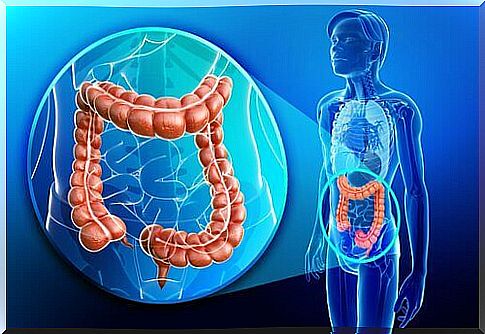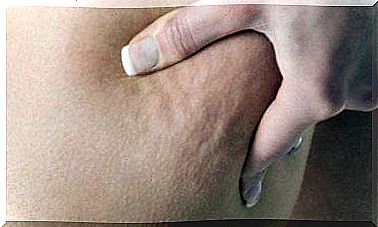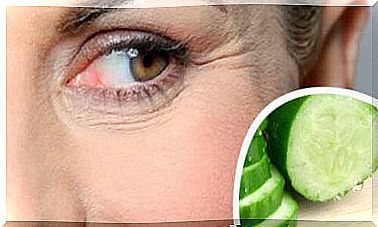5 Tips To Avoid Ulcerative Colitis Attacks

Ulcerative colitis is a chronic autoimmune disease that affects the lining of the gut. The symptoms arise when this lining of the colon, rectum, or both becomes inflamed. So the question we’re going to answer today is how you can try to avoid attacks of ulcerative colitis.
The disease can go into remission for periods and then cause only mild or barely noticeable symptoms. However, there are also periods when you experience seizures or outbreaks. During these periods you can experience daily complaints such as:
- diarrhea
- stomach ache
- colic
Treatment is partly dependent on medical considerations and factors such as age, habits and health of the patient. However, there are some general recommendations that can help you relieve some symptoms and prevent complications.
How do you recognize ulcerative colitis attacks?

Ulcerative colitis is considered an autoimmune disease that affects the intestinal tract. The clinical signs of ulcerative colitis can vary from person to person, depending on your immune system response and lifestyle, among other things.
Most patients experience mild symptoms or asymptomatic episodes. However, the disease is accompanied by attacks in which you may experience symptoms and problems such as:
- intense abdominal pain
- increase in a rumbling gut
- blood in your stool
- diarrhea
- slight fever
- rectal pain
- sudden weight loss
- nutrient deficiencies
- skin problems
- loss of appetite and nausea
Tips for Dealing with Ulcerative Colitis Attacks
To properly treat ulcerative colitis attacks, it is very important that you get a proper medical diagnosis from a doctor. He or she can order tests to determine if the symptoms you’re experiencing are due to ulcerative colitis or caused by other problems such as Crohn’s disease or diverticulosis.
The medical examination may include blood tests, stool samples, a barium enema, or colonoscopy. If the results then indicate ulcerative colitis, the doctor may prescribe a number of medications and suggest lifestyle changes. In the most severe cases, surgery may be required.
There are some tips and measures that can help prevent and treat these ulcerative colitis attacks. They are simple measures that you can take in your daily life, both during times of remission and during seizures. Put them into practice!
1. Limit the intake of dairy products

Currently, there isn’t enough evidence to confirm or rule out that your diet causes ulcerative colitis attacks. However, research has been able to show that some foods and drinks can make symptoms worse, especially during outbreaks.
Some studies have found evidence of worsening symptoms associated with dairy consumption in some patients.
Regular consumption of dairy products can potentially worsen symptoms such as abdominal pain, diarrhea and gas. You can reduce your consumption to see if this produces favorable results for you. So test whether the following products affect your symptoms:
- milk
- cheese
- ice
- ultra-processed yogurt
2. Increase Fiber Intake
Dietary fiber plays a very important role in your digestion. However, in the case of ulcerative colitis, eating fiber can be either a good or a bad thing. This is entirely dependent on the situation.
Eating dietary fiber can help maintain regular digestion during periods of remission. However, when there are attacks of ulcerative colitis, it can actually be counterproductive.
Eating a lot of fiber can make many symptoms worse, such as inflammation, gas and diarrhea. It is therefore best to limit your consumption, but not completely stop eating, of products such as:
- whole grains
- dried fruit
- nuts
- vegetables
- other fiber sources
3. Avoid alcoholic and energy drinks

Another thing to keep in mind when dealing with ulcerative colitis are the drinks choices you should take to keep your body hydrated. Water is without a doubt the best option. However, some teas and infusions are also helpful.
- In general, you should completely avoid alcoholic beverages and drinks containing stimulants (such as caffeine).
- Beer and wine, but also coffee and soft drinks can increase intestinal peristalsis and worsen diarrhea symptoms.
- In addition, soft drinks can cause and exacerbate gas.
4. Eat small meals
Another measure that can help alleviate the symptoms of this disease is to spread your meals more evenly throughout the day. Instead of three main meals during the day, it is better to have five or six smaller meals. This reduces the burden on your digestive system and can subsequently promote intestinal balance.
5. Control Stress

Clearly, stress is not the cause of ulcerative colitis. However, recent studies have shown the potential impact of stress on worsening colitis symptoms. It is similar to the appearance of pimples in some people when exposed to constant stress and anxiety.
So it’s helpful to know how to manage stress. For some people this is very important to minimize symptoms. Some measures to minimize stress include:
- do regular exercise
- undergo therapeutic massages
- take advantage and enjoy aromatherapy sessions
- meditate and do yoga
Do you suffer from this disease? Do not forget to visit the doctor regularly. While you may have asymptomatic periods, it is always best to get checked to see how this condition develops.









